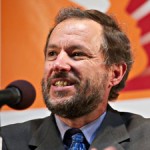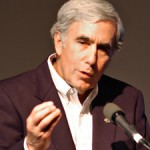Archive for June, 2013
The last colony: Beyond dominant narratives on the Western Sahara roundtable
By Stephen Zunes
This is one of seven pieces in Jadaliyya’s electronic roundtable on the Western Sahara. Moderated by Samia Errazzouki and Allison L. McManus, it features contributions from John P. Entelis, Stephen Zunes, Aboubakr Jamaï, Ali Anouzla, Allison L. McManus, Samia Errazzouki, and Andrew McConnell.
Western Sahara is a sparsely-populated territory about the size of Italy, located on the Atlantic coast in northwestern Africa, just south of Morocco. Traditionally inhabited by nomadic Arab tribes, collectively known as Sahrawis and famous for their long history of resistance to outside domination, the territory was occupied by Spain from the late 1800s through the mid-1970s. With Spain holding onto the territory well over a decade after most African countries had achieved their freedom from European colonialism, the nationalist Polisario Front launched an armed independence struggle against Spain in 1973. This—along with pressure from the United Nations—eventually forced Madrid to promise the people of what was then still known as the Spanish Sahara a referendum on the fate of the territory by the end of 1975.
More…
Whose ‘Two State’ solution? End game or intermission?
By Richard Falk
From many sources there is a widespread effort to resume a peace process that has in the past led to failure, frustration, and anger, and often to renewed violence. The newly appointed American Secretary of State, John Kerry, is about to make his fifth trip to Israel since the beginning of 2013, insisting that the two sides try once more to seek peace, and warning if this doesn’t happen very soon, the prospects for an agreed upon solution will be postponed not for just a year or two, but for decades.
Kerry says if this current effort does not succeed, he will turn his attention elsewhere, and that the United States will make no further effort. So far, aside from logging the air miles, seems perversely to be responsive to Tel Aviv’s demands for land swaps to allow settlement blocs to be incorporated into Israel and to promote further Palestinian concessions in relation to security arrangements, and totally unresponsive to Ramallah’s demands for some tangible signs from the Israeli government that resumed negotiations will not be another slammed door. In this vein, Kerry’s most ardent recent plea was at the Global Forum, an annual event organized under the auspices of the American Jewish Committee. Kerry told this audience that they possessed the influence to make the peace talks happen.
Somewhat surprisingly, even Marwan Barghouti writing from prison, Read the rest of this entry »
Today the world was blessed with a new hero: Edward Snowden
By Jan Oberg
Spontaneous thoughts at having seen this interview three times in a row.
One moral individual standing up for true democracy and freedom against one of the most evil systems the world has ever seen.
The Guardian: “Snowden will go down in history as one of America’s most consequential whistleblowers, alongside Daniel Ellsberg and Bradley Manning. He is responsible for handing over material from one of the world’s most secretive organisations – the NSA.
In a note accompanying the first set of documents he provided, he wrote: “I understand that I will be made to suffer for my actions,” but “I will be satisfied if the federation of secret law, unequal pardon and irresistible executive powers that rule the world that I love are revealed even for an instant.”
I am deeply moved by Edward Snowden. Very deeply. Such civil courage. Such moral awareness. Such knowledge. Such intellectual clarity. Such determination combined with the humility of serving a higher cause.
Do I at all understand what this one single, determined individual is up against? How he dares? No, I don’t think I do. It is too great, too unique, too rare in a world of so much opportunism and “somebody else must do what must be done”.
I’m reminded of Gandhi’s dictum that “A burning passion coupled with absolute detachment is the key to all success.”
Today the world was blessed with a hero of such proportions that it is hard to believe it is true. As long as there is an Ellsberg, a Manning and now a Snowden – and thousands of other courageous unsung heroes fighting for a better world, I will not abandon my hope.
For years I have ended my courses and public lectures by saying that I don’t believe much in peace movements but I believe that every human being is, potentially, a peace movement. Snowden is yet another living proof of this.
– Jan Oberg
Lessons from the U.S.-Korea nuclear crisis
By David Krieger
The high-profile nuclear crisis on the Korean Peninsula, pitting the reigning heavyweight nuclear champion, the United States, against the bantamweight nuclear contender, North Korea, is not finished and is deadly serious. The posturing and exchanges that the world has been witnessing are capable of spiraling out of control and resulting in nuclear war. Like the Cuban Missile Crisis more than half a century ago, this crisis demonstrates that nuclear dangers continue to lurk in dark shadows across the globe.
This crisis, for which the fault is shared by both sides, must be taken seriously and viewed as a warning that nuclear stability is an unrealistic goal. The elimination of nuclear weapons, an obligation set forth in the Non-Proliferation Treaty and confirmed by the International Court of Justice, must be a more urgent goal of the international community. The continued evasion of this obligation by the nuclear weapon states makes possible repeated nuclear crises, nuclear proliferation, nuclear terrorism and nuclear war.
Lessons can be drawn Read the rest of this entry »
America’s war criminals
By Jonathan Power
Someone, somewhere, has to say it – that the U.S. harbours war criminals of its own and they have served not that long ago at the apex of power in the American government.
Alas, no one is going to act like the recently deceased Robert McNamara who served as Secretary of Defence under presidents John F. Kennedy and Lyndon Johnson. In one speech he described himself as a war criminal – for being party to the nuclear bombing of Hiroshima and Nagasaki and for his role in the Vietnam war.
The Obama Administration has to move faster and harder. Last month President Barack Obama implicitly criticised himself for not getting the Guantanamo prison closed. Admittedly to do so has been made very difficult as the Republicans in the Senate have blocked his every move. But he could do more, like transferring some federal courts to Guantanamo.
One wonders if once again if it will all come to nothing, as did the talk that has gone on for decades about prosecuting the former National Security Advisor and Secretary of State to President Richard Nixon, Henry Kissinger. Read the rest of this entry »
On Barack Obama’s re-election
By Richard Falk
We share with your editorial (Nov. 11, 2012) the view that one of President Obama’s “singular contributions has been his vision of a world without nuclear weapons.” We would go further, and suggest that realizing this vision would ensure Mr. Obama a legacy of honor, not only for American, but for the world. Your editorial adds a caveat that nuclear disarmament “is a lofty goal that would not be achieved in his second term, or maybe for years after this.”
We dissent from this bit of conventional wisdom that almost always accompanies the affirmation of the goal, almost taking back what was so grandly proposed. In our view there has rarely been a better time to initiate a negotiated process of phased nuclear disarmament, and there is no reason that such a process should be stretched out over a long period. Read the rest of this entry »
EU Commission supports manipulative research for post-democracy
By Johan Galtung
How do the elites of declining empires react? One answer is demoralization. Like 26,000 annual acts of sexual harassment in the US Army leaving little time for killing; and one US soldier on active duty committing suicide every 18 hours–higher than combat deaths–the figures for veterans being one every 80 minutes. Or else, simply giving up empires–like the colonial powers did before and after the official abolition of colonialism (UN Charter Art. 73). Like Moscow outside and inside the Soviet Union, copying England with a Commonwealth of Independent States. Like the USA is partly doing, and partly not, hanging on to the last countries willing to kill for them, like Canada, Norway, Japan, Georgia. And partly not, working on imperial strongholds in Africa and the Pacific; doing the long distance killing themselves.
But what do such dubious elites do with their own peoples? Wise elites wash their hands off imperialism, declare it passé, a mistake, retool their economies for less dependence on resources and markets from and in their peripheries that now process the resources themselves for themselves and others. Read the rest of this entry »
US policy weakens Iran’s pro-democracy movement
By Stephen Zunes
While the outcome of the Iranian elections scheduled for June 14 may be hard to predict, it will make little difference as long as power remains firmly in the hands of Ayatollah Khamenei and other hard-line clerics. Indeed, while there are contending factions vying for the country’s relatively weak presidency, the narrow ideological spectrum within which candidates are allowed to run for public office offers little hope for change — at least through the electoral system.
Following the 2009 election, in which the incumbent right-wing president Mahmoud Ahmadinejad was declared the winner despite his apparent loss to the popular reformist Mir-Hossein Mousavi, the people of Iran rose up in a popular civil insurrection, which was brutally crushed.
While it is hard to guess how soon democracy will come to Iran, the government’s theft of the election and subsequent crackdown — shattering the illusion many Iranians still held that they could work within a rigged political system — may have brought that day closer. Read the rest of this entry »
Ending perpetual war? Endorsing drone warfare?
By Richard Falk
That President Obama chose on 23 May to unveil his second term cautionary approach to counter-terrorism at the National Defense University epitomized the ambiguity of the occasion. The choice of venue was itself a virtual guarantee that nothing would be said or done on that occasion that challenges in any fundamental way the global projection of American military power.
Obama’s skillfully phrased speech was about refining technique in foreign policy, achieving greater efficiency in killing, interrogating the post-9/11 war mentality, and all the while extolling the self-mystifying glories of American exceptionalism. That is, only the United States, and perhaps Israel and NATO, possessed an entitlement to use force at times and places of the actor’s choosing without consulting the UN, respecting the constraints of international law, and heeding the admonition in the Declaration of Independence to show “a decent respect for the opinions of mankind.” Read the rest of this entry »
Yara Abbas in her own words
By Sharmine Narwani
Today I try to honor a young woman who made an impact on me in one meeting long ago. Syrian journalist Yara Abbas’ love for her country and the soldiers who protected her in combat zones humanized these young men for me, when it was altogether so easy to write them off with the rest of the media as killing machines.
I felt during our interview that she was out in the field protecting these boys as much as they were protecting her. And so she made me give them a second look. RIP.
Last week Yara Abbas was killed by a sniper. Here is Sharmine Narwani’s interview with her from last year. Yara was the 38th media casualty in the Syrian conflict…






